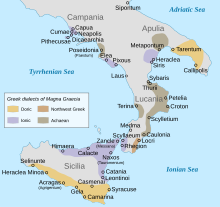Italian school (philosophy)

The Italian School of Pre-Socratic philosophy was in Italy or Magna Graecia in the 6th century BC.[1] The Italian School included such thinkers as Pythagoras,[2] Parmenides of Elea, Zeno of Elea, and Empedocles. Diogenes Laërtius divides pre Socratic philosophy into the Ionian and Italian School.[3][4] Pythagoras traveled from Samos to Croton, beginning the separation from the earlier Ionian schools.
According to Diogenes Laërtius, the succession goes Pythagoras (“pupil of Pherecydes”), Telauges (his son), Xenophanes, Parmenides, Zeno of Elea, Leucippus, Democritus (“who had many pupils”), Nausiphanes [and Naucydes] (“in particular”), and Epicurus (Succession ends).[5]
References
- ^ Blakey, Robert (April 21, 1848). "History of the Philosophy of Mind: Embracing the Opinions of All Writers on Mental Science from the Earliest Period to the Present Time". Trelawney Wm. Saunders – via Google Books.
- ^ Bibliotheca Sacra. Dallas Theological Seminary. 1851.
- ^ Laks, André (May 3, 2018). "The Concept of Presocratic Philosophy: Its Origin, Development, and Significance". Notre Dame Philosophical Reviews. Daniel W. Graham.
- ^ "A History of Western Philosophy 1.3". maritain.nd.edu.
- ^ "The Succession of Philosophical Schools – Donald Robertson". 4 March 2013.
